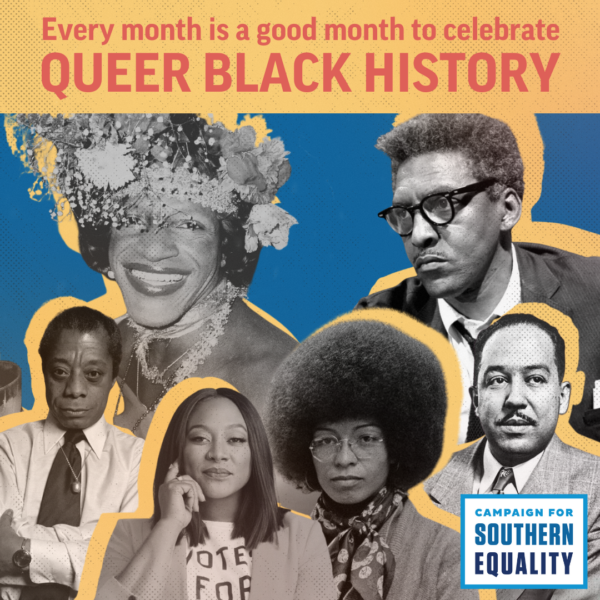Each year during Black History Month in February, Americans raise their hands in celebration of the Black lives that have come before us. Many are the same notable figures we learn about in textbooks – people like Martin Luther King, Jr., Rosa Parks, John Lewis, Madame CJ Walker, and Jackie Robinson. Of course, the versions we learn about in school are often watered-down details of their life’s story and the cultural and societal impact they had on the United States that we know today – and it’s critical to note that these are not the only names that should be remembered when honoring the significance of Black culture.

While their stories are vital pieces to the America that we see before us, there are many more who have paved the way and been consequential to America’s history. Many of these voices, of course, are LGBTQ+ people – and it’s so important that we resist the erasure of Black LGBTQ+ historical figures.
Many of the household names we know today were also accompanied by Black LGBTQ+ leaders who paved the way in their own right. While Martin Luther King, Jr. is known as the pinnacle of social justice and activism within the Black community, it is also important to remember the name of Bayard Rustin, a queer and Black civil rights activist, who served as a close advisor to King. Labeled as one of the “most influential and effective organizers” in the civil rights movement, it was his leadership that helped lead to the success of the “March on Washington” in 1963. In just under two months, despite pushback from other civil rights leaders, he was able to guide more than 200,000 participants to the nation’s capital to peacefully protest for jobs and freedom. It was at this very event that King would go on to give his memorable, “I Have a Dream” speech. And sixty years later, that speech still resonates with so many and is used as the framework for organizing and protesting injustice.
But while we go on to learn about King and his memorable speech, the life and legacy of Rustin is largely dismissed from the textbooks. If it had not been for the leadership and persistence of Rustin, one of America’s most iconic events and speeches would not have been made possible. To think that the textbooks could leave out a piece of history that is so pivotal to the story is severely telling of the need for deeper representation, especially for Black LGBTQ+ figures.
But while we go on to learn about King and his memorable speech, the life and legacy of Rustin is largely dismissed from the textbooks. If it had not been for the leadership and persistence of Rustin, one of America’s most iconic events and speeches would not have been made possible.
Marsha P. Johnson, a Black trans and queer activist, who was essential in the LGBTQ+ rights movement, is another name and story that helped pave the way for generations of LGBTQ+ folks. Through her activism, Johnson saved countless lives, but similar to the life of Rustin, the textbooks leave out her name and impact.
In a time where both Black and LGBTQ+ literature and history is being removed and erased from classrooms right before our very eyes, it’s more vital than ever to speak the names of those who have come before us. It is up to us to say their names, so that stories can continue to be shared. Names like Angela Davis, James Baldwin, Langston Hughes, Alicia Garza and so many more are proof that queer Black people have always and will continue to exist. No matter the adversity in their way, these individuals strived to turn their experiences into a lesson to better aid and support future generations to come.
In a time where both Black and LGBTQ+ literature and history is being removed and erased from classrooms right before our very eyes, it’s more vital than ever to speak the names of those who have come before us.
As we look to the future, we must understand that Black LGBTQ+ history, at the root, is American history. The trials and tribulations, but also the glory and praise of those both past and present, cannot be contained to just a single month. Black LGBTQ+ history cannot be ignored to avoid discomfort. It is imperative that the history and legacies of those past and present be spoken and remembered, or if not we are guilty of repeating the transgressions of the past.
To be Black and to be queer is to boldly proclaim your existence even at the risk of being turned away. The uniqueness and authenticity that we see from Black LGBTQ+ people is a beautiful reminder that intersectionality does exist. To those from the past, I say thank you. Your contributions have not gone in vain and your legacies will continue to live on in the voices of a new generation. And while the fight against injustice is far from over, we honor you by continuing the fight that so many of you started. As a collective, we will continue to champion for a safer and more equitable future, so all can be their most authentic self.

